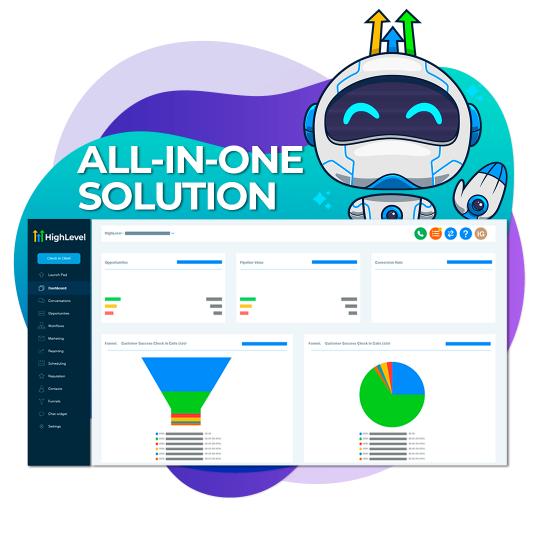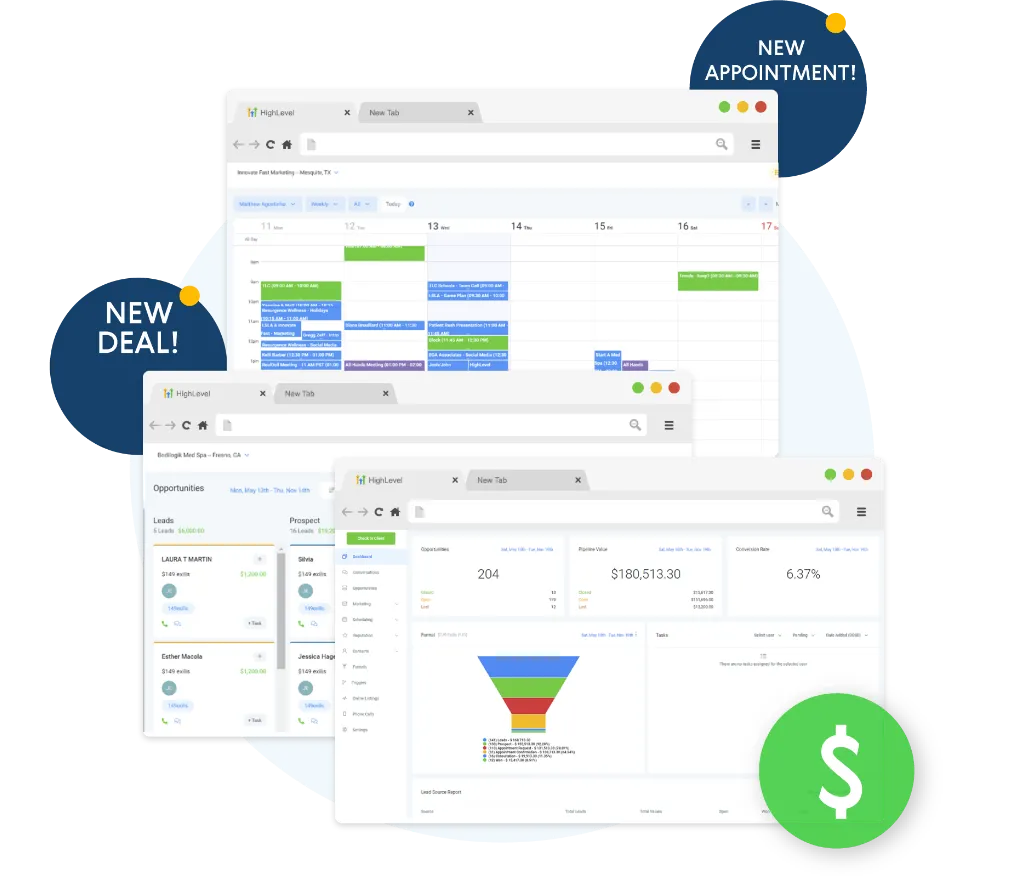Your team can spend too much time fixing messy data in your CRM. Think of all the files that get old and wrong over time. When your data is bad, it's like having a broken compass – you can't make good choices. It costs a lot of money when data goes bad. Workers waste time, and your business loses sales. But there's good news! You can fix this by checking your data often and making sure everything stays clean and true. This helps your CRM work the way it should, like a well-oiled machine.
Feeling overwhelmed by missed leads and disorganized workflows?
Discover the award-winning platform that automates follow-ups, tracks every lead, and keeps your business running smoothly—all in one place. Thousands of businesses are already transforming their sales and marketing with this trusted solution. Don’t miss out—start your 14-day free trial today and click now to uncover exclusive, limited-time special offers!
Data Overload: The Hidden Costs

Bad data is hurting many businesses. Think of all the wrong information sitting in company files. It's like having a messy desk, but much worse.
Every three years, more than one in four files gets old and wrong. This means workers can't trust what they read. They waste time fixing mistakes and looking for the right info. Many workers spend almost two hours each day just dealing with data problems.
Almost all companies know they've wrong info in their files. This costs them lots of money. They pay too much to store copies of the same thing. They buy bigger systems they don't need. Plus, when they use bad data to make choices, they make bad choices.
This is like trying to drive with a dirty windshield. You can't see well, you go slow, and you might crash. Companies need clean, clear data to work well.
Breaking Point of CRM Systems
Your CRM system is like a bridge. When too many people run across it at once, it can break. This happens when teams don't use the tools the right way.
Think of your customer data like a garden. Without care, bad weeds grow. Each year, three out of ten files get old and wrong. When people type things by hand, they make more mistakes.
Many teams face this problem. They rush to set up their tools. They skip teaching their staff. They add too many fancy parts. When this happens, the system stops working well.
Bad data hurts your money and your friends. In the US, wrong info costs three trillion dollars each year.
To keep your system strong, you need three things:
- Set it up the right way
- Train your team well
- Take good care of your data
Ready to simplify your business operations?
Streamline your workflows and boost productivity with a CRM designed to save you time and effort. From tracking leads to automating follow-ups, this platform does it all. Discover what’s possible—learn more about how it works and see why so many businesses rely on it every day.
When Quality Trumps Quantity

We care more about good data than lots of data.
Think of your CRM like a closet. A few nice, clean shirts are better than a messy pile of old clothes. When your data is clean and right, you can trust it.
Bad data is like having wrong phone numbers – it wastes time and can get you in trouble. Keep your records simple and true.
Make sure they all look the same. This helps you make smart choices and saves time fixing mistakes.
Less Data, Better Results
We need less data to do better work. Having too much information in our customer systems can hurt more than help.
Think of data like toys. It's better to have a few good toys than a messy room full of broken ones. When we pick only the best data to keep, we can do more with it.
We can make sure our data is good by checking it often. We teach our team to put in only the facts we really need. This stops big mistakes from happening and helps us take better care of our customers.
Clean vs. Cluttered Records
Bad data hurts companies a lot. It wastes money and time. Think about it – messy files cost U.S. companies over $3 trillion each year.
Clean records help your business grow. When your files are neat and correct, you can sell more and keep more happy customers. Your team can work better when they can find what they need fast.
To keep your records clean, you need good rules about how to store data. You also need tools that find and fix mistakes.
It's best to keep things clean from the start, as fixing messy data later costs more time and money.
Still struggling to keep your business organized?
Take the guesswork out of managing leads and follow-ups with a platform trusted by thousands of businesses. Say goodbye to missed opportunities and hello to a seamless sales process. Act now—try it free for 14 days and discover how easy it is to stay on top of your workflow. Don’t wait—exclusive offers won’t last long!
The Human Factor
People make mistakes. That's why we need to help teams work better together. When people work in places where mistakes can be dangerous, like hospitals or airplanes, it's very important to understand how humans think and act.
Teaching teams to work together isn't just about rules. It's about learning from what works in flying planes and using those ideas in other jobs. Everyone needs to help make this work – both the workers and the bosses.
Some places have strong leaders who make all the choices. In these places, it can be hard to get everyone to share ideas. The best way is to show how good teamwork stops mistakes.
Teams need to meet face to face to learn how to talk and work together well.
Resource Drain and Operational Inefficiencies

Bad CRM systems hurt companies and cost them money. When data is wrong or messy, it costs about 10% of what a company makes each year. Workers waste time typing the same things over and over.
Teams get frustrated when they can't find what they need. They spend too much time looking for information instead of helping customers.
The problems spread all over the company. Teams can't work well together because they can't share information. One in four customer files has old or wrong contact info. This makes customers unhappy.
This isn't just a computer problem. It affects everyone in the company. It makes it hard to help customers and stay ahead of other companies.
Struggling to keep up with your growing business?
Simplify your processes and stay ahead with a CRM that adapts to your needs. Manage leads, automate tasks, and focus on what matters most—growing your business. Take the first step—explore the features today and see how it can transform the way you work.
Security Risks and Compliance
Keeping your CRM system safe is a must these days.
Bad people on the web want to steal your data. When this happens, you lose trust from your customers. Many laws now say you must protect customer data.
Watch out for these big risks:
- Fake emails that trick workers into sharing passwords
- Staff members who might use data the wrong way
- Data that moves without proper locks
- Easy-to-guess passwords that let bad people in
- Wrong ways of storing data that can cost you money
To stay safe, you need strong passwords, regular checks, and
[Note: Text remains incomplete as per original]
Customer Trust at Stake

We know you care about keeping your information safe. When you share your personal details with a company, you want to trust them. Most people won't buy from businesses that don't protect their private data.
We must be clear about how we collect and use your data. Many people check privacy rules before they pick which apps to use on their phones. When we tell you what we do with your data, you can feel safe working with us.
Being open about how we protect your data helps build trust. When people trust us, they keep coming back. Nearly half of all customers only work with companies they know will keep their data safe.
Data Privacy Matters Most
Your Privacy Is Important
Many of us worry about our data online. You want to know what companies do with your info. You're not alone – most people feel the same way.
Think about when you shop or browse online:
- Half of us only trust stores that protect our data well
- 4 in 10 people fear their info might be shared with others
- Almost half of us care more about online safety than anything else
- Most of us read how stores will use our info first
- Some people stop using stores that take their info without asking
More and more people want their data kept safe. This makes stores change how they handle our info. You have the right to know what happens to your data.
The old way of sharing everything online is over. Now, we all think twice about what we share. Stores must earn our trust to get our info.
Trust Through Transparent Policies
We want to be open with you about how we use your data. Being clear helps us earn your trust.
We care about doing the right thing with your information. This means we:
- Write down simple rules about data use
- Keep your details safe and up to date
- Follow the laws about privacy
- Tell you what we're doing
We check our work often to make sure we're keeping our promises.
We also listen to what you tell us. This helps us do better and shows you we mean what we say.
When we're honest with you, we build a real friendship.
That's what we want most – for you to know you can trust us.
Building Long-term Relationships
Trust grows when you care about customers and treat them like real people. You need to be open about how you use their information. You also need to help them in ways that matter to them.
Don't ask customers for too much info. Only get what you really need. Talk to them in ways they like best. Make each talk count instead of just gathering lots of data.
Simple ways to build trust:
- Keep customer info safe and simple
- Talk to people the way they want
- Give real help, not just collect data
- Add a human touch to every chat
- Check that you use info to help people
Data Integration Nightmares
Joining our customer data systems can be a real headache. When teams keep their data in different places, it gets messy. Some files don't match up, and we often see the same customer listed more than once.
To fix this, we need to check our data often to make sure it's clean and right. Joining systems costs a lot of money, and making them talk to each other can be hard.
We also need to keep customer info safe. Bad people might try to steal it.
To do well, we need to make sure all our data looks the same, keep it safe, and make it easy to use as we grow bigger.
The Price of Poor Implementation

Bad CRM systems cost you more than you think.
Your team wastes time typing the same info over and over. They get mad when things break and quit their jobs. This means you have to hire and train new people.
When customer info is wrong, you miss sales. You also make customers unhappy.
All this could be fixed if you set up your CRM the right way from the start.
Hidden Operational Costs Surge
We know you want your business to run better with CRM tools. But many costs stay hidden when you don't set them up well. These costs hurt your daily work and make you lose money.
Bad data costs U.S. companies over $3 trillion each year. Here's what can go wrong:
- Workers slow down during setup, and each one can cost you $3,000 to $12,000
- Wrong data makes you miss sales, which can cost up to $15 million each year
- Bad customer care makes 75% of firms lose clients
- Time gets wasted fixing the same records twice
- Wrong data leads to bad choices – 44% of firms lose money this way
The costs add up fast when your data isn't clean and your team can't work well. But you can stop these problems by knowing about them now.
Staff Burnout Rates Increase
Bad CRM systems hurt people, not just money.
When team members can't trust their work tools, they waste lots of time fixing mistakes. They've to look for the right info and fix wrong data instead of doing their real jobs.
This makes workers feel tired and sad. When people spend all day fixing problems, they stop caring about their work.
The team starts to slow down because they get stuck dealing with bad data.
Lost Revenue From Errors
Bad CRM systems hurt your business and cost you money. Think of CRM like a broken cash register – it makes you lose money in many ways.
When your customer data is wrong:
- Your ads don't reach the right people
- Your sales team calls the same people over and over
- Your customers feel ignored
- You miss chances to make sales
- You waste time fixing mixed-up records
Most companies lose $15 million each year from bad data. Every wrong number or old email adds up to real money lost.
In fact, U.S. companies lose $3.1 trillion from messy data each year. That's about 10% of the money they could have made.
Bad data doesn't just slow you down – it takes money right out of your wallet.
Performance Issues and System Failures
Many teams face problems with their customer tracking tools. Salespeople tell us it's hard to get these systems working well. Half of all sales teams have trouble setting them up. Most companies can't get their whole team to use them.
The biggest problem is getting different tools to work together. Many people can't get their customer data to match up right. Sales teams spend too much time typing in customer details by hand. Most people only use a small part of what these tools can do.
Teams are often too busy to check if their tools work well. These are common problems that slow down work and make it hard to help customers.
But knowing about these problems can help teams fix them and do better work.
Decision Paralysis From Information Overflow

Too much data can make it hard to make choices. Think of your brain like a cup – when you pour in too much water, it spills over. The same happens with too much customer info.
When you look at all the numbers and charts in your CRM system, your mind can freeze up. It's like trying to pick one toy from a huge toy store. Your team might feel stuck when they see:
- Too many chat logs with customers
- Too many ways to look at the same info
- Too many groups of customers
- Too many ways to track success
- Updates that never stop coming in
The fix is simple: Pick only the most important things to look at. Make clear rules about what info matters most.
Think of it like cleaning up a messy room – keep what you need, put away what you don't.
This way, you and your team can make better choices faster. Less info means clearer thinking.
Training and Adoption Challenges
Moving to a new CRM takes work, and people mightn't like it at first. Your team may want to stick with what they know. Bad training can make them feel lost and mad.
When the CRM looks too hard or breaks down, people get upset. If they can't get help, they won't use all the good tools in the system.
To fix this, give your team lots of practice with the new CRM. Show them how it works in ways they can follow.
Keep checking on them and help them when they get stuck. Make sure someone is there to fix problems fast.
When you take care of your team, they'll use the new CRM much better.
Digital Hoarding Consequences

Too much data in your work tools can cause big problems. When you keep every little thing, it can make your job harder. Think of it like having a messy desk – it's hard to find what you need!
Your team can get stuck looking for the right info in piles of old stuff. This makes work slow. It's also not safe to keep too much data, as bad people might try to steal it.
Big problems from keeping too much data:
- Paying more money to store files
- Wrong info about what customers want
- Workers feeling tired from too much info
- Lost money when you can't reach customers
- Breaking rules about keeping data safe
To fix this, clean up your data often. Make rules about what to keep and what to delete. This helps everyone work better and keeps your info safe.
Conclusion
Too








